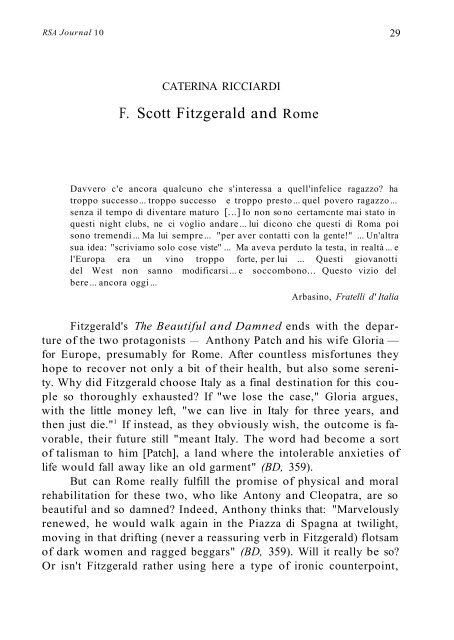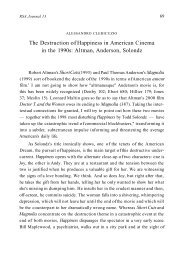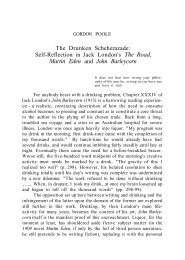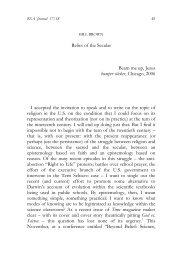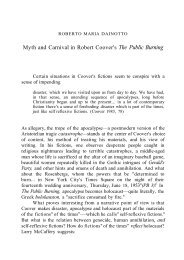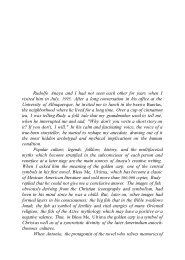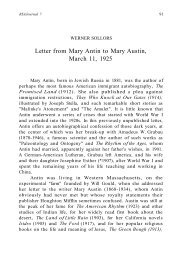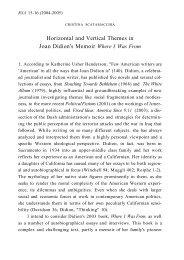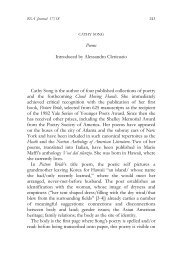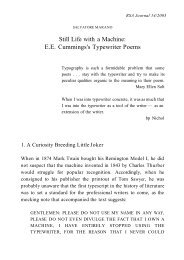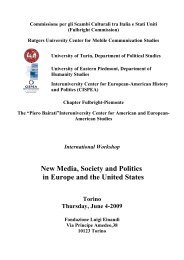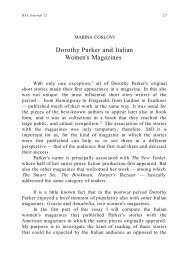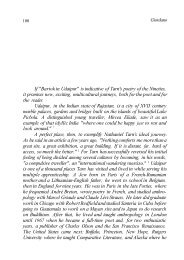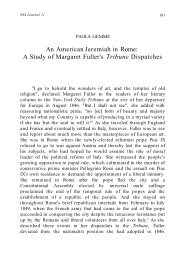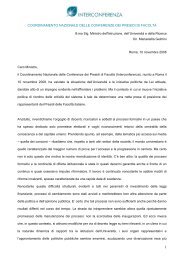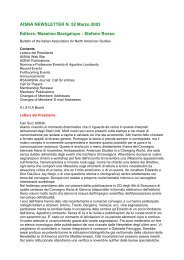F. Scott Fitzgerald and Rome - aisna
F. Scott Fitzgerald and Rome - aisna
F. Scott Fitzgerald and Rome - aisna
Create successful ePaper yourself
Turn your PDF publications into a flip-book with our unique Google optimized e-Paper software.
RSA Journal 10 29<br />
CATERINA RICCIARDI<br />
F. <strong>Scott</strong> <strong>Fitzgerald</strong> <strong>and</strong> <strong>Rome</strong><br />
Davvero c'e ancora qualcuno che s'interessa a quell'infelice ragazzo? ha<br />
troppo successo... troppo successo e troppo presto... quel povero ragazzo...<br />
senza il tempo di diventare maturo [...] Io non so no certamcnte mai stato in<br />
questi night clubs, ne ci voglio <strong>and</strong>are... lui dicono che questi di Roma poi<br />
sono tremendi... Ma lui sempre... "per aver contatti con la gente!" ... Un'altra<br />
sua idea: "scriviamo solo cose viste" ... Ma aveva perduto la testa, in realtà ... e<br />
l'Europa era un vino troppo forte, per lui ... Questi giovanotti<br />
del West non sanno modificarsi ... e soccombono... Questo vizio del<br />
bere... ancora oggi ...<br />
Arbasino, Fratelli d' Italia<br />
<strong>Fitzgerald</strong>'s The Beautiful <strong>and</strong> Damned ends with the departure<br />
of the two protagonists — Anthony Patch <strong>and</strong> his wife Gloria —<br />
for Europe, presumably for <strong>Rome</strong>. After countless misfortunes they<br />
hope to recover not only a bit of their health, but also some serenity.<br />
Why did <strong>Fitzgerald</strong> choose Italy as a final destination for this couple<br />
so thoroughly exhausted? If "we lose the case," Gloria argues,<br />
with the little money left, "we can live in Italy for three years, <strong>and</strong><br />
then just die." 1 If instead, as they obviously wish, the outcome is favorable,<br />
their future still "meant Italy. The word had become a sort<br />
of talisman to him [Patch], a l<strong>and</strong> where the intolerable anxieties of<br />
life would fall away like an old garment" (BD, 359).<br />
But can <strong>Rome</strong> really fulfill the promise of physical <strong>and</strong> moral<br />
rehabilitation for these two, who like Antony <strong>and</strong> Cleopatra, are so<br />
beautiful <strong>and</strong> so damned? Indeed, Anthony thinks that: "Marvelously<br />
renewed, he would walk again in the Piazza di Spagna at twilight,<br />
moving in that drifting (never a reassuring verb in <strong>Fitzgerald</strong>) flotsam<br />
of dark women <strong>and</strong> ragged beggars" (BD, 359). Will it really be so?<br />
Or isn't <strong>Fitzgerald</strong> rather using here a type of ironic counterpoint,
30<br />
RSA Journal 10<br />
reminiscent perhaps of the American literary tradition by which<br />
<strong>Rome</strong> is a city of ruins as well as the allegory of a city where one<br />
may easily ruin oneself?<br />
That <strong>Fitzgerald</strong> was working toward an ironic ending is attested<br />
to by his correspondence with Maxwell Perkins concerning the<br />
first drafts of the novel. 2 Within that framework, one cannot help being<br />
startled by a paradox: Anthony's great attraction to <strong>Rome</strong> is particularly<br />
centered upon Italian women, "always beautiful <strong>and</strong> always<br />
young" (BD, 359), <strong>and</strong> yet, at the same time, he is also well aware of<br />
women as the principal cause of his ruin: "All the distress that he had<br />
ever known, the sorrow <strong>and</strong> the pain, had been because of women"<br />
(BD, 360).<br />
The prospect of a Roman future, with a <strong>Rome</strong> more longed for<br />
than realistically present, has a very clear purpose in the novel,<br />
which is that of making Anthony's bitter experience turn full circle.<br />
It is against the background of <strong>Rome</strong> that the novel actually starts:<br />
from the first short paragraphs, dedicated to Anthony's past, one<br />
learns that he has just returned from a long stay in <strong>Rome</strong> where he<br />
became interested in architecture <strong>and</strong> painting <strong>and</strong> in the Renaissance.<br />
<strong>Rome</strong> prompted him to make a stab at composing, perhaps in<br />
the manner of his beloved Keats, "some ghastly Italian sonnets" (BD,<br />
13). And now, back in New York, he would like to write a book on<br />
the history of the Popes. It was in <strong>Rome</strong> that he had been enchanted<br />
by "the peculiar charm of Latin women" (BD, 13), very much like<br />
Roderick Hudson who had been fascinated by Christina Light. <strong>Rome</strong>,<br />
in short, gave him "a delightful sense of being very young <strong>and</strong> free<br />
in a civilization that was very old <strong>and</strong> free" (BD, 13).<br />
Thus, The Beautiful <strong>and</strong> Damned develops from one <strong>Rome</strong> to<br />
another <strong>Rome</strong>: a Roman idyll forms a sort of framework linking past<br />
<strong>and</strong> future, <strong>and</strong> within that absent topography there is New York, already<br />
a harbinger of devastating decadence.<br />
In This Side of Paradise Amory Blaine also has his own Roman<br />
dream. His mother Beatrice had been educated in <strong>Rome</strong>, "at the Sacred<br />
Heart convent - an educational extravagance," <strong>Fitzgerald</strong> admits,<br />
"that in her youth was only for daughters of exceptional<br />
wealth" (TSP, 11). She lived her youth in Renaissance splendor, upto-date<br />
with the most recent gossip about the old Roman families,
RSA Journal 10<br />
<strong>and</strong> known "by name as a fabulously wealthy American girl to Cardinal<br />
Vittori <strong>and</strong> Queen Margherita <strong>and</strong> more subtle celebrities that<br />
one must have had some culture even to have heard of" (TSP, 11).<br />
Beatrice O'Hara Blaine had absorbed "the sort of education that will<br />
be quite impossible ever again [...]; a culture rich in all arts <strong>and</strong> traditions,<br />
barren of all ideas, in the last of those days when the great<br />
gardener clipped the inferior roses to produce one perfect bud"<br />
(TSP, 11). What comes out clearest here is the mocking of a whole<br />
educational tradition, of a certain type of upbringing, of, as it were,<br />
a "sentimental journey."<br />
One senses then, in <strong>Fitzgerald</strong>'s allusions to <strong>Rome</strong>, an underlying<br />
irony, the cynical unmasking of a myth — if that of <strong>Rome</strong> is a<br />
myth —, which appears definitely a dubious or even an imperfect<br />
one. <strong>Rome</strong> seems to be the target of the early <strong>Fitzgerald</strong>'s gentle<br />
sneer, of the style typical, for example, of This Side of Paradise,<br />
which consists of a vein at times ironic, full of gibes, epigrams <strong>and</strong><br />
paradoxes, at times completely imbued by a "subtle <strong>and</strong> romantic<br />
despair." 3 And yet the protagonists — the young <strong>and</strong> the not so<br />
young — of his early novels do not give up their Roman dream: suffice<br />
it to recall Monsignor Darcy when he announces with great<br />
pride that his post will be <strong>Rome</strong> (from where, according to Alberto<br />
Arbasino, he will return with the 'Spanish' flu that will cause his<br />
death 4 ). Amory himself dreams of his trip to Italy with Rosalind (TSP,<br />
169), a trip postponed for a very long time, that is since he was thirteen<br />
when, to the astonishment of the other passengers <strong>and</strong> after only<br />
four hours of sailing, the ship taking him to <strong>Rome</strong> gently changes<br />
its tack <strong>and</strong> returns to New York to deposit him on the pier with a<br />
sudden attack of appendicitis (TSP, 15). Irony at times spills into<br />
pathos.<br />
<strong>Fitzgerald</strong> eventually reached <strong>Rome</strong> not with Rosalind but with<br />
Zelda (Rosalind's model) in June 1921. The Beautiful <strong>and</strong> Damned,<br />
with its peculiar Roman frame, had been completed <strong>and</strong>, before his<br />
departure, he had set up its serialization in Metropolitan (from September<br />
1921 to March 1922). The publication of the book by Scribner's<br />
was planned for March 1922; <strong>and</strong> in the middle of all that there<br />
was this trip to <strong>Rome</strong>, a procrastinated honeymoon, with Zelda expecting<br />
<strong>Scott</strong>ie.<br />
31
32 RS A Journal 10<br />
The main purpose was a visit to the Vatican, desired by his<br />
mother Molly McQuillan, who — incidentally — was the very opposite<br />
of the beautiful <strong>and</strong> refined Beatrice O'Hara Blaine. The couple<br />
stayed at great expense in the sumptuous <strong>and</strong> rather new Gr<strong>and</strong> Hotel,<br />
regrettably infested by fleas. Years later in the famous "Show Mr.<br />
And Mrs. F. to Number—," included in The Crack-Up, <strong>Fitzgerald</strong><br />
would remember especially the fleas of <strong>Rome</strong>: "But there were fleas<br />
on the gilded filigree of the Gr<strong>and</strong> Hotel in <strong>Rome</strong>; men from the<br />
British Embassy scratched behind the palms; the clerks said it was<br />
the flea season" (CU, 42).<br />
The immediate reactions were in fact much more complex <strong>and</strong><br />
not just limited to an admittedly bothersome problem with insects.<br />
Apart from the emotions roused by the pilgrimage to Keats's house,<br />
his first Roman stay was far from pleasant. Actually, it was rather depressing,<br />
<strong>and</strong> made worse by his excessive drinking. Even many<br />
years later, in a long 1930 letter, concerning the bitter history of their<br />
marriage, Zelda could not refrain from reproaching him for "<strong>Rome</strong><br />
<strong>and</strong> your friends from the British Embassy <strong>and</strong> your drinking, drinking"<br />
(LL, 191).<br />
Drinking will be the determining factor in a future Roman debacle.<br />
But now, in 1921, <strong>Fitzgerald</strong>'s reactions to the Italians are<br />
more absorbing. In a letter written to Edmund Wilson in June 1921<br />
(not in May as indicated by Andrew Turnbull) he defines them as<br />
"philistine, anti-socialistic, provincial <strong>and</strong> racially snobbish" (L, 326).<br />
The Italians, in short, seem very different from the Northerners, they<br />
are little more than 'negroes': "The negroid streak creeps northward<br />
to defile the Nordic races," he writes using terms that he will later<br />
lend to Tom Buchanan 5 ; <strong>and</strong> he goes on arguing: "Already the Italians<br />
have the souls of blackamoors. Raise the bars of immigration<br />
<strong>and</strong> permit only Sc<strong>and</strong>inavians, Teutons, Anglo-Saxon <strong>and</strong> Celts to<br />
enter" (L, 326). Not sufficient to calm him down is Wilson's long appeasing<br />
answer (an essay in its own right), in which <strong>Fitzgerald</strong>'s<br />
long-time friend entreats him to review such extreme opinions <strong>and</strong><br />
to stay longer in Europe so as to discover its beauty <strong>and</strong> render "a<br />
service to American letters: your novels," Wilson concludes, "would<br />
never be the same afterward. " 6<br />
More light-hearted, although still tremendously cutting ("acidu
RSA Journal 10 33<br />
lous [<strong>and</strong> rather silly]", as <strong>Fitzgerald</strong> defines it in a letter to Maxwell<br />
Perkins [DS/DM, 44]), is the sketch entitled "Three Cities," published<br />
in Brentano's Book Chat in the fall of 1921:<br />
We were in <strong>Rome</strong> two weeks. You can see the fascination of the place. We<br />
stayed two weeks even though we could have left in two days — that is we<br />
could have left if we had not run out of money. I met John Carter, the author<br />
of "These Wild Young People," in the street one day <strong>and</strong> he cashed me a<br />
check for a thous<strong>and</strong> lira. We spent this on ointment.<br />
The ointment trust thrives in <strong>Rome</strong>. All the guests at the two best hotels are<br />
afflicted with what the proprietors call "mosquitos too small for screens." We<br />
do not call them that in America.<br />
John Carter lent us "Alice Adams" <strong>and</strong> we read it aloud to each other under the<br />
shadow of Caesar's house. If it had not been for Alice we should have collapsed<br />
<strong>and</strong> died in <strong>Rome</strong> as so many less fortunate literary people have done.[...]<br />
By bribing the ticket agent with one thous<strong>and</strong> lira to cheat some old general<br />
out of his compartment — the offer was the agent's, not ours — we managed<br />
to leave Italy.<br />
"Vous avez quelque chose pour déclarer" Asked the border customs officials<br />
early next morning (only they asked it in better French).<br />
I awoke with a horrible effort from a dream of Italian beggars.<br />
"Qui!' I shrieked, "Je veux déclare que je suis trés, trés heureux a partir d 'Italie"<br />
I could underst<strong>and</strong> at last why the French loved France. They have seen<br />
Italy. 7<br />
This sketch was the only thing he managed to produce from his<br />
European <strong>and</strong>, in particular, Italian experiences. In spite of being<br />
urged by many, <strong>Fitzgerald</strong> didn't feel like writing anything; as he told<br />
Perkins in December 1921: "I think I may be able to use my European<br />
impression a little later but at present [...] I haven't many ideas<br />
on the subject" (DS/DM, 44). No, he had no desire to recount anything,<br />
partly because he had no fond memories (even the despised<br />
"carabinieri" make their first appearance in this sketch of 1921), <strong>and</strong><br />
partly because, at this point, he was deeply involved with an elaborate<br />
revision (on the proofs as was his habit) of The Beautiful <strong>and</strong><br />
Damned which was to come out in March 1922. Perhaps that depressing<br />
trip caused alterations in the Roman frame of his novel, particularly<br />
apropos of its 'ironic' ending. One may argue as well that<br />
the Roman setting which appears at first so desirable, albeit with a<br />
touch of irony, starts to look like an increasingly decadent <strong>and</strong> even
3<br />
RSA Journal 10<br />
foreboding scene if one recalls that, among other fictional ill-fated<br />
characters, in the usually joyous Piazza di Spagna in <strong>Rome</strong>, exactly<br />
100 years earlier died the great Keats.<br />
Disappointments, however, tend to wear off rather quickly. The<br />
<strong>Fitzgerald</strong>s, excited by alcohol <strong>and</strong> success, were just embarking at<br />
that time on their never-ending Long Isl<strong>and</strong> feast. And it is there that<br />
we find them during the first months of 1924. He was now involved<br />
with The Great Gatsby, having trouble completing it because of his<br />
constant need for money, the eternal problem which forced him to<br />
write short stories (eleven between November 1923 <strong>and</strong> April 1924,<br />
earning seventeen thous<strong>and</strong> dollars).<br />
It is a well-known fact that the couple spent lavishly <strong>and</strong> was<br />
always debt-ridden. The sketch "How To Live On 36,000 Dollars a<br />
Year" dates back to these months, followed in September by its companion<br />
"How To Live On Practically Nothing a Year." The first describes<br />
the extravagant life on Long Isl<strong>and</strong>, the second that on the<br />
Riviera, where, in fact, the <strong>Fitzgerald</strong>s moved in April "to economize"<br />
(AA, 101). Since everything on the Riviera was reportedly very<br />
cheap, their stay there would allow him to complete The Great Gatsby<br />
in peace.<br />
In the second sketch one notices the beginning of a new<br />
process. The enchantment of the Riviera — "the more liquid dark,"<br />
the "heavy roses <strong>and</strong> the nightingales in the pines," "the beauty of<br />
this proud gay l<strong>and</strong>" (AA, 116) — deeply remembered in Tender Is<br />
the Night, was suddenly broken. The <strong>Fitzgerald</strong>s became aware of<br />
the "High Cost of Economizing" (AA, 114), while their marriage was<br />
on the strain for the first time because of the French aviator Edouard<br />
Jozan with whom Zelda, left alone too long for Gatsby, fell madly in<br />
love. This incident had a direct influence on the famous scene at the<br />
plaza in The Great Gatsby. Zelda's sentimental adventure contributed<br />
to make the (by no means less expensive) air of the Riviera too hot<br />
to boot. <strong>Fitzgerald</strong> sent Perkins the manuscript on 27 October, 1924<br />
<strong>and</strong>, despite his first dreadful experience, decided to spend "a warm<br />
quiet economical winter in <strong>Rome</strong>." 8<br />
After a long trip by car with stops in San Remo, Savona, Pisa,<br />
Florence, a trip sustained by "real Italian food" 9 — mostly by "maccheroni"<br />
—, the young couple arrived around the middle of Novem
RSA Journal 10<br />
ber in "a large city where everyone was driving on the wrong side<br />
of the street, except me. The man who tried to arrest me told me<br />
this was <strong>Rome</strong> <strong>and</strong> I had better do as the Romans do." 10 The new<br />
Roman stay occurred in a particularly difficult time for the <strong>Fitzgerald</strong>s:<br />
Zelda was "trying to have a baby" (LL, 192), <strong>and</strong> the fascist<br />
rise to power was in full swing11 together with the hysteria of the<br />
Holy Year. The immediate outcome of this sojourn was a third, little<br />
known sketch, an unfinished essay full of gaps, with the meaningful<br />
title "The High Cost of Macaroni," published posthumously<br />
in 1954. It was conceived as the final part of a triptych on the material<br />
(merely 'material'?) cost of living on Long Isl<strong>and</strong>, the Riviera<br />
<strong>and</strong> in <strong>Rome</strong>.<br />
Why <strong>Rome</strong> again? Was it just because it was cheaper? Or wasn't<br />
<strong>Fitzgerald</strong> ideally following other pilgrimages: that of Monsignor Fay,<br />
for example, or of his dear Keats, who with his nightingale is immortalized<br />
once more in the title of Tender Is the Night <strong>and</strong> in its epigraph?<br />
Actually, it was the reading of Roderick Hudson in October<br />
1924 12<br />
that enticed Zelda deeply. Truly there could not have been a<br />
more intriguing <strong>and</strong> foreboding reading, a more appropriate representation<br />
of the unraveling of a curious destiny lurking for <strong>Fitzgerald</strong><br />
in the Roman ruins, the same pathetic destiny of those Jamesian<br />
characters for whom <strong>Rome</strong> plays a fatal role: Daisy Miller, Roderick<br />
Hudson, Isabel Archer.<br />
From the very start the Roman sojourn was not under a good<br />
star. The search for an apartment, for example, was complicated by<br />
those whom <strong>Fitzgerald</strong> calls "speculators":<br />
This was Holy Year. Only one year in every twenty-five is Holy Year — <strong>and</strong><br />
we had blundered right into it. To the Roman business man, Holy Year is that<br />
period when he counts on making enough profit out of foreign pilgrims to<br />
enable him to rest for twenty-five years more. A host of speculators — army<br />
officers, black-h<strong>and</strong>ers, waiters, mule drivers, morticians <strong>and</strong> princes of the<br />
blood — round up every edifice that can be disguised as an apartment house<br />
<strong>and</strong> wait for the Americans. 13<br />
In short, prices were high for makeshift accommodations in old<br />
<strong>Rome</strong>, hastily restored <strong>and</strong> 'modernized' with rather rinky-dink bath<br />
tubs. The <strong>Fitzgerald</strong>s liked better to lodge at the Hotel Quirinale on<br />
35
36<br />
RSA Journal 10<br />
Via Nazionale, <strong>and</strong> later at the Hotel des Princes in Piazza di Spagna<br />
(formerly Albergo di Londra, closed in 1931 14 ) , but neither place left<br />
them with very good memories. The somewhat gloomy atmosphere<br />
of the Quirinale was later summoned in "Show Mr. <strong>and</strong> Mrs. F. to<br />
Number — ": "Marion Crawford's mother died in the Quirinal Hotel<br />
at <strong>Rome</strong>. All the chamber-maids remember it <strong>and</strong> tell the visitors<br />
about how they spread the room with newspapers afterwards"<br />
(CU, 44).<br />
Everything that happened in <strong>Rome</strong> in those months found its<br />
way into Tender Is the Night. It is in the rooms of the Quirinale that<br />
the love-story between Dick <strong>and</strong> Rosemary ends. Francis Marion<br />
Crawford, too, makes an appearance in the novel, not at the Quirinale,<br />
but at the Excelsior, where late at night: "Baby Warren lay in<br />
bed, reading one of Marion Crawford's curiously inanimate Roman<br />
stories" (TN, 247). Truly a very peculiar irony! For, during that<br />
reading, the most agitated <strong>and</strong> animated night of the novel takes<br />
place.<br />
The situation at the Hotel des Princes was not any better. In<br />
"The High Cost of Macaroni" it is morbidly renamed "Hotel de la<br />
Morgue":<br />
The building itself had been erected over the tomb of one of the early emperors<br />
<strong>and</strong> the elevator shaft was obviously in direct communication with the<br />
open mausoleum. There was an atmosphere for you. [...] There was something<br />
very foreign <strong>and</strong> "old-world" about it. It was awful. ... 15<br />
Equally "awful" sounds a long list of discomforts <strong>and</strong> complaints:<br />
the cold weather, the damp sheets, the "snores of the people<br />
next door" (CU, 44), the fake mineral water, the terrible driving of the<br />
Romans, the dishonesty <strong>and</strong> the violence of the Italians <strong>and</strong>, last but<br />
not least, the eternal problems with the food, basically — <strong>and</strong> somewhat<br />
ironically — "Bel Paese" cheese <strong>and</strong> the usual macaroni ("Macaroni<br />
with grated meat" or "Spaghetti with pulverized tomatoes" or<br />
even "Vermicelli with annihilated cheese"). 16 However, in spite of all<br />
this, things at the Hotel des Princes went a bit better simply because<br />
it offered the enchantment of Piazza di Spagna with a view of Keats's<br />
house.
RSA Journal 10<br />
A less disappointing image (possibly for commercial reasons)<br />
of <strong>Rome</strong> can be found in "Show Mr. <strong>and</strong> Mrs. F. to Number —":<br />
We were too superior at that time to use the guide books <strong>and</strong> wanted to discover<br />
the ruins for ourselves, which we did when we had exhausted the<br />
night-life <strong>and</strong> the market places <strong>and</strong> the campagna. We liked Castello Sant'Angelo<br />
because of its rounded mysterious unity <strong>and</strong> the river <strong>and</strong> the debris<br />
about its base. It was exciting being lost between centuries in the Roman<br />
dusk <strong>and</strong> taking your sense of direction from the Colosseum. (CU, 44-45)<br />
How apparently joyful <strong>and</strong> leisurely this family strolling<br />
through the city! And yet how odd, indeed, that they take their<br />
"sense of direction from the Colosseum," the site where so many<br />
American fictional characters lose it: just think of Daisy Miller, Roderick<br />
Hudson <strong>and</strong> Isabel Archer.<br />
The truth is that the <strong>Fitzgerald</strong>s deeply disliked <strong>Rome</strong>; there<br />
was no way for them to come to terms with the city. In February<br />
1925, exhausted, they eventually left for Capri. On April 19, while<br />
traveling back to France, <strong>Scott</strong> wrote to Roger Burlingame:<br />
Italy depressed us both beyond measure — a dead l<strong>and</strong> where everything<br />
that could be done or said was done long ago — for whoever was deceived<br />
by the pseudo-activity under Mussolini is deceived by the spasmodic last jerk<br />
of a corpse. In these days of criticism it takes a weak bunch of desperates to<br />
submit for 3 years to a tyrant, even a mildly beneficent one. (L, 479)<br />
Except for the mention of Mussolini, these words echo those of<br />
the protagonist in "A Penny Spent" (1925), a little known short story<br />
set in Italy, on Capri <strong>and</strong> in the countryside south of Naples:<br />
in the hot mysterious shin of the Italian boot where the Mafia sprang out of<br />
rank human weeds <strong>and</strong> the Black H<strong>and</strong> rose to throw its ominous shadow<br />
across two continents. [... ] "I'm glad I'm American," [the girl tells her companion].<br />
"Here in Italy I feel that everybody's dead. So many people dead <strong>and</strong><br />
all watching from up on those hills - Carthaginians <strong>and</strong> old Romans <strong>and</strong><br />
Moorish pirates <strong>and</strong> medieval princes with poisoned rings." (BP, 125-126)<br />
One can detect no sympathy at all in that gothic transfiguration<br />
of a piece of our Southern l<strong>and</strong>scape. <strong>Fitzgerald</strong> seems to be very far<br />
indeed from the unique charm of the Riviera with its nightingales<br />
37
38 RSA Journal 10<br />
<strong>and</strong> heavy roses in the "liquid dark." Nevertheless, the Roman winter,<br />
however depressing, was of remarkable importance in his career.<br />
The reasons are manifold; all in all, <strong>Rome</strong> brought about: a successful<br />
revision of The Great Gatsby, a renewed relationship with Henry<br />
James's work; the seed of Tender Is the Night, with the Roman-Jamesian<br />
motif of the gradual ruin of the protagonist; <strong>and</strong> last but not<br />
least, a direct contact with the American movie world: in those<br />
months, on the Appian Way, by the Porta San Sebastiano, against<br />
gr<strong>and</strong>iose cardboard backdrops, Fred Niblo was filming Ben Hur,<br />
starring Carmel Myers <strong>and</strong> Ramon Novarro. The <strong>Fitzgerald</strong>s often<br />
joined the crew -actually, it became their favorite pastime in those<br />
unhappy months. Ben Hur (1925), the last colossal of Hollywood's<br />
adolescence, is a story of ancient <strong>Rome</strong> at the beginning of her decadence.<br />
In Tender Is the Night it will be ironically renamed, perhaps<br />
after Du Bellay, or Pound, or Poe, The Gr<strong>and</strong>eur That Was <strong>Rome</strong>.<br />
So it was in <strong>Rome</strong> that <strong>Fitzgerald</strong> set himself to work on a careful<br />
revision of The Great Gatsby, on the galley proofs which arrived<br />
from New York. He worked on them for over two months <strong>and</strong> sent<br />
them back in such a tormented shape he had to admit to Perkins on<br />
December 20 that they were "one of the most expensive affairs since<br />
Madame Bovary. Please charge it to my account" (DS/DM, 89). The<br />
correspondence with Perkins records the various phases of revision<br />
<strong>and</strong> rearrangement, of the structural balance of parts <strong>and</strong> chapters, of<br />
the orchestration of the symbolic details. Moreover, the famous<br />
scene of the Plaza was thoroughly rewritten; the meaning of Doctor<br />
Eckelburg's eyes was clarified; the evocation of the "old isl<strong>and</strong>" <strong>and</strong><br />
of the "fresh, green breast of the new world" which closed the first<br />
chapter was moved to the end 17 . And while <strong>Scott</strong> worked, Zelda this<br />
time worked with him too, drawing repeatedly the face of Gatsby<br />
"until her fingers ached" (DS/DM, 89). At the end of such a trial he<br />
could assert with satisfaction: "I know Gatsby better than my own<br />
child" (DS/DM, 89). Of course, this is not to say that <strong>Rome</strong> had any<br />
part at all in the revision of the novel, <strong>Fitzgerald</strong> would have done it<br />
anyway: it was his habit to create his masterpieces from proofs.<br />
However, it was <strong>Rome</strong> where, by his own admission, he definitely<br />
had more time <strong>and</strong> fewer distractions.<br />
With the corrected proofs back in New York <strong>and</strong> some regret at
RSA Journal 10<br />
the discarded 'Roman' title ("My heart tells me I should have named<br />
it Trimalchio" [DSDM, 94]), in February the family moved to Capri:<br />
"I've brought Gatsby to life," he writes Perkins on February 18, at the<br />
end of his Roman stay: "We're moving to Capri. We hate <strong>Rome</strong>. I'm<br />
behind financially <strong>and</strong> have to write three short stories. Then I try<br />
another play, <strong>and</strong> by June, I hope, begin my new novel" (L, 177).<br />
In fact, as the labored revision of The Great Gatsby was coming<br />
to an end, the seed of Tender Is the Night started germinating <strong>and</strong>,<br />
unlike Gatsby, it owes everything to the Roman sojourn <strong>and</strong> to the<br />
so far underestimated influence of Henry James that <strong>Fitzgerald</strong> absorbed<br />
also through Van Wyck Brooks's The Pilgrimage of Henry<br />
James (1925) 18 .<br />
If, as has been mantained, Roderick Hudson is a remaking of<br />
The Marble Faun 19 , then Tender Is the Night can be read in turn as a<br />
remaking of Roderick Hudson, since it seems to inherit not only the<br />
very subject but also some of its structural faults 20 . A comparison between<br />
the two novels would take us astray. However, it is worth recalling<br />
that both of them focus on the dissipation of a young <strong>and</strong><br />
promising American against the background of <strong>Rome</strong>. Roderick<br />
Hudson <strong>and</strong> Dick Diver - incidentally, both from Virginia- are ruined<br />
by a woman <strong>and</strong> perhaps by too much drinking. After their Roman<br />
"catastrophe" (the word "catastrophe" is used by James <strong>and</strong> by<br />
<strong>Fitzgerald</strong> as well 21 ), both of them end up in Switzerl<strong>and</strong>. As with<br />
Daisy Miller, the Switzerl<strong>and</strong>-<strong>Rome</strong> axis proves fatal to them.<br />
Let's now come to the Roman "catastrophe" of <strong>Fitzgerald</strong>/<br />
Dick Diver <strong>and</strong> to Tender Is the Night. Besides all the discomforts of<br />
a cold — albeit politically 'hot' — winter in a Holy-Year-dishonest-violent-petty-fascist-vulgar-<strong>Rome</strong>,<br />
something else occurred around 20<br />
December 1924 which marked <strong>Fitzgerald</strong> deeply. He would never be<br />
able to open-heartedly recount the serious, debasing incident that<br />
happened to him in the 'eternal city.' On 23 January 1925, replying<br />
to Harold Ober who was urging him to write about <strong>Rome</strong>, he was<br />
forced to decline: "I hate Italy <strong>and</strong> the Italiens [sic], so violently that<br />
I can't bring myself to write about them for the Post" (LL, 94). And<br />
in a note apparently written in 1929 he states cryptically: "I've lain<br />
awake whole nights practicing murders. After I — after a thing that<br />
happened to me in <strong>Rome</strong> I used to imagine whole auditoriums filled<br />
39
40<br />
RSA Journal 10<br />
with the flower of Italy, <strong>and</strong> me with a machine gun concealed on<br />
the stage. All ready. Curtain up. Tap-tap-tap-tap-tap." 22 Dick Diver's<br />
reactions are very much the same, although not as violent: "What<br />
had happened to him was so awful that nothing could make any difference<br />
unless he could choke it to death, <strong>and</strong>, as this was unlikely,<br />
he was hopeless. He would be a different person henceforward"<br />
(TN, 254).<br />
The Roman incident described in the novel inexorably undermines<br />
Dick's moral superiority, <strong>and</strong> he thus loses his match against<br />
the "very rich" Warrens: "it had been a hard night but she [Baby Warren]<br />
had the satisfaction of feeling that, whatever Dick's previous<br />
record was, they now possessed a moral superiority over him for as<br />
long as he proved of any use" (TN, 256). As with <strong>Fitzgerald</strong> himself,<br />
his humiliation forces Dick to conceal it in shameful silence. He will<br />
give "Nicole an expurgated version of the catastrophe in <strong>Rome</strong>" (TN,<br />
262).<br />
In "The High Cost of Macaroni" the debacle staged in Tender Is<br />
the Night is conveyed less dramatically (definitely in a less dramatic<br />
tone), yet more bitingly <strong>and</strong> sarcastically, to the point that it becomes<br />
almost comical. After a long series of unpleasant incidents, <strong>Fitzgerald</strong><br />
tells us he had been forced into using the arrogant <strong>and</strong> uncivilized<br />
"methods" of the Italians:<br />
We jumped into a taxicab <strong>and</strong> drove up to the Hotel Mazuma Americana. The<br />
afternoon tea dance was beginning <strong>and</strong> our eyes lighted upon the Princess<br />
Dumbella <strong>and</strong> her two cavaliers of the month before leisurely approaching<br />
the last vacant table. I rushed up to the head waiter. "Look here," I said. "I<br />
have to have that table. I'm Claude Lightfoot, the great American money king<br />
<strong>and</strong> if I can't have that table I'll call the Italian loan."<br />
"But Signor, the Princess Dumbella—"<br />
"Enough! Get me Signor Mussolini on the telephone."<br />
In a moment the Dumbella party was intercepted. A barricade of waiters<br />
formed in front of them, on both sides of them, jostling, tripping, apologizing<br />
23<br />
Princess Dumbella becomes, more appropriately, Princess Orsini<br />
in Tender Is the Night. Here the setting is the bar of the Hotel Excelsior<br />
<strong>and</strong> later the cabaret called "Bombonieri" where the first big,
RSA Journal 10<br />
albeit confusedly described, fight over the reserved table takes place.<br />
At this point Dick is totally drunk. However, it is in the brawl with<br />
the taxi drivers that the uncivilized ways of the Italians take on a definite<br />
shape. "I decided to try my fascisti methods" —<strong>Fitzgerald</strong> writes<br />
in "The High Cost of Macaroni"—, "I had no castor oil h<strong>and</strong>y but I<br />
approached the first chaffeur with a menacing eye." 24 There is no<br />
mention in the sketch of his broken nose, the night in prison with<br />
the hated "carabinieri" <strong>and</strong> the humiliation suffered as a result of<br />
knocking out "John Alex<strong>and</strong>er Borgia, the chief of the secret police<br />
of the carbonieri [sic]." 25 Apparently unharmed, the protagonist of<br />
the sketch decides to leave for Capri, "where the Emperor Tiberius<br />
used to go when <strong>Rome</strong> got too hot for him. People have been going<br />
there for much the same reasons ever since... " 26<br />
Although it would be worthwhile exp<strong>and</strong>ing upon the documentary<br />
significance of "The High Cost of Macaroni" — indeed, it is<br />
a colorful, angry indictment against fascist <strong>Rome</strong>—, it seems more<br />
appropriate to emphasize the importance that it holds in relation to<br />
<strong>Fitzgerald</strong>'s new novel. This posthumous <strong>and</strong> unfinished sketch is, in<br />
fact, to be considered in every respect the ur-text (albeit an unpretentious<br />
one) of Tender Is the Night. Even by 20 December 1924, he<br />
announces to Perkins:<br />
I'm a bit (not very - not dangerously) stewed tonight & I'll probably write you<br />
a long letter. We're living in a small, unfashionable but most comfortable hotel<br />
at $525.00 a month including tips, meals etc. <strong>Rome</strong> does not particularly<br />
interest me but its (sic) a big year here, <strong>and</strong> early in the spring we're going to<br />
Paris. [...] I've got a new novel to write - title <strong>and</strong> all, that'll take about a year.<br />
Meanwhile, I don't want to start it until this is out & meanwhile I'll do short<br />
stories for money. (DS/DM, 88)<br />
He had already in mind "title <strong>and</strong> all" of his new novel. In fact,<br />
the unfortunate <strong>and</strong> not at all "tender" Roman night, started giving<br />
life to the "Francis Melarky version" of Tender Is the Night, on which<br />
<strong>Fitzgerald</strong> worked from 1925 to 1930 when he shifted to the "Kellyshipboard<br />
version" <strong>and</strong> then to the final "Dick Diver version." In the<br />
original version (with its four different titles: "Our Type", "The<br />
World's Fair", "The Melarky Case" <strong>and</strong> "The Boy Who Killed His<br />
Mother") it is Francis Melarky, in <strong>Rome</strong> with an American movie<br />
41
42<br />
RSA Journal 10<br />
crew, who suffers the humiliation of being beaten by the "carabinieri"<br />
after a drunken brawl. The episode constituted the "Prologue"<br />
— a real Roman flash-back of about thirty pages — of the first<br />
version which begins in June 1925 on the Riviera, where Melarky arrives<br />
with his mother from Italy. Both of them are the prototypes for<br />
Rosemary <strong>and</strong> Mrs. Hoyt. 27 By 1932 that account of the degeneration<br />
of a promising American expatriate becomes chapter VII of the "Dick<br />
Diver version," which will be later included in the second book of<br />
Tender Is the Night. 28 Notwithst<strong>and</strong>ing the numberless alterations to<br />
the theme <strong>and</strong> the plot of the novel within the span of nine years, it<br />
is amazing that <strong>Fitzgerald</strong> never discarded the episode of the 'brutality'<br />
of the Roman night. Besides, his moving those original first thirty<br />
pages further ahead in the final structure of the novel is much<br />
more important than it might appear at first.<br />
Dick Diver arrives in <strong>Rome</strong> in search of Rosemary, presumably,<br />
in 1929 (not in 1924-1925) 29 , when his decline is already quite evident.<br />
This is so because <strong>Fitzgerald</strong> intended to stress the coincidence<br />
of the Roman catastrophe—his own <strong>and</strong> that of his character — with<br />
the advent of a particularly inauspicious year. The decadent (even<br />
politically) Roman l<strong>and</strong>scape mirrors a collapse, a 'fall', which is not<br />
only Dick Diver's <strong>and</strong> Francis <strong>Scott</strong> <strong>Fitzgerald</strong>'s but that of a whole<br />
era: the roaring Twenties. One seemingly insignificant detail will suffice<br />
to illustrate what <strong>Fitzgerald</strong> had in mind.<br />
Upon his arrival, Dick goes to the Hotel Quirinale <strong>and</strong>, waiting<br />
for a suit that is being pressed, reads in the Corriere della Sera an article<br />
on "una novella di Sainclair [sic] Lewis 'Wall Street' nella quale<br />
l'autore analizza la vita sociale di una piccola citra Americana" (TN,<br />
227). The change from "Main Street" to "Wall Street" is striking: it is<br />
quite unlikely that the Italian journalist could have contributed a<br />
lapse so cynically appropriate to the climate of the novel (there are<br />
other allusions to the "stock market" here), especially since the news<br />
should date back to <strong>Fitzgerald</strong>'s stay in Italy—that is, either 1921 or<br />
1924-1925. 30<br />
There is hardly any need to exp<strong>and</strong> on the descriptions of<br />
<strong>Rome</strong> in Tender Is the Night, or on the details of Dick's wild night<br />
<strong>and</strong> of Baby Warren's coming to his rescue. It would be useful to recall,<br />
however, that <strong>Rome</strong> is full of fatal omens: from the specter of
RSA Journal 10<br />
Marion Crawford <strong>and</strong> of her mother to that of Keats in Piazza di<br />
Spagna where Dick arrives coming from Via Nazionale after having<br />
passed through the "foul tunnel" (TN, 240) of the Tritone. Even the<br />
walk with Rosemary on the Pincian Hill doesn't foretell anything<br />
promising as the following detail, so pregnant with sterility, shows:<br />
Rosemary "plucked a twig <strong>and</strong> broke it, but she found no spring in<br />
it" (TN, 240). For Dick <strong>Rome</strong> will be "the end of his dream of Rosemary"<br />
(TN, 240). Like Daisy Miller before her, Rosemary (certainly a<br />
much more compromised version of Daisy) will bid him adieu to follow<br />
the not quite nice Nicotera, "one of the many hopeful Valentinos"<br />
(TN, 231), actually a new <strong>and</strong> perhaps even more compromised<br />
version of Giovanelli.<br />
The unhealthy air of <strong>Rome</strong> will certainly not kill Rosemary, it<br />
will rather be waiting for Dick at the nightclub exit (his own Colosseum,<br />
indeed), with its "marshy vapor," so typical of 19th century<br />
<strong>Rome</strong>:<br />
There was dirty water in the gutters <strong>and</strong> between the rough cobblestones; a<br />
marshy vapor from the Campagna, a sweat of exhausted cultures tainted the<br />
morning air. (TN, 244)<br />
The lights <strong>and</strong> celestial breezes sung by the nightingale do not<br />
mellow Dick Diver's Roman night. His "rough cobblestones" are<br />
more reminiscent of Hawthorne's <strong>Rome</strong>, "of her narrow, crooked, intricate<br />
streets, so uncomfortably paved with little squares of lava that<br />
to tread over them is a penitential pilgrimage." 31<br />
Entirely cut off from the romantic idea of the 'eternal city' harbored<br />
by Keats <strong>and</strong> Shelley, <strong>Fitzgerald</strong>'s experience may be considered<br />
a trial (further complicated by fascist vulgarity) most American<br />
writers usually undergo before (if at all) they manage to come to<br />
terms with the beauty <strong>and</strong> the many complexities of the city. Indeed,<br />
for <strong>Fitzgerald</strong> that night in December 1924 was neither pleasant nor<br />
in the least "tender."<br />
1 F. <strong>Scott</strong> <strong>Fitzgerald</strong>, The Beautiful <strong>and</strong> Damned, Harmondsworth, Penguin,<br />
1974, p. 346. Unless otherwise stated, <strong>Fitzgerald</strong>'s books <strong>and</strong> collections of letters<br />
will be cited in the text by abbreviations for titles <strong>and</strong> page numbers. The following<br />
editions are used: This Side of Paradise, Harmondsworth, Penguin, 1965, TSP; The<br />
43
44 RSA Journal 10<br />
Beautiful <strong>and</strong> Damned (op.cit.), BD; The Great Gatsby, with an introduction by<br />
Tony Tanner, Harmondworth, Penguin, 1990, GG; Tender Is the Night, Harmondsworth,<br />
Penguin, 1986, TN, The Crack-Up, edited by Edmund Wilson, New<br />
York, New Directions, 1956, CU; Afternoon of an Author: A Selection of Uncollected<br />
Stories <strong>and</strong> Essays, edited by Arthur Mizener, New York, Scribners, 1957, AA; Bits of<br />
Paradise, selected by <strong>Scott</strong>ie <strong>Fitzgerald</strong> Smith <strong>and</strong> Matthew J. Bruccoli, Harmondsworth,<br />
Penguin, 1976, BP; The Letters of F.S.<strong>Fitzgerald</strong> edited by Andrew<br />
Turnbull, New York, Dell Publishing Co., Inc., 1965, L; Dear <strong>Scott</strong>/Dear Max: The<br />
<strong>Fitzgerald</strong>-Perkins Correspondence, edited by John Kuehl <strong>and</strong> Jackson R. Bryer,<br />
New York, Scribners, 1971, DS/DM; A Life in Letters, edited by Matthew J. Bruccoli<br />
with the assistance of Judith S. Baugham, New York, Touchstone, Simon & Schuster<br />
Inc., 1995, LL.<br />
2 On "the extraordinarily effective irony of the last few paragraphs" see, in<br />
particular, Perkins's letters of December 27 <strong>and</strong> 31, 1921 (DS/DM, p.49-50) <strong>and</strong><br />
Matthew J. Bruccoli, Some Sort of Epic Gr<strong>and</strong>eur: The Life of F. <strong>Scott</strong> <strong>Fitzgerald</strong>, New<br />
York, Carrol <strong>and</strong> Graf Publishers, Inc., 1991, p. 176-184.<br />
3 Elio Chinol, "Due storici della crisi americana: F. <strong>Scott</strong> <strong>Fitzgerald</strong> <strong>and</strong> James<br />
T. Farrell" in Comunità, VII (18 aprile 1953), p. 53-54.<br />
4 Alberto Arbasino, Fratelli d'Italia, Milano, Adelphi, 1993, p. 869.<br />
5 See Tom's tribute to the Northern races, under the influence of Lothrop<br />
Stoddard's The Rising Tide of Colour. " 'The idea is if we don't look out the white<br />
race will be - will be utterly submerged. It's all scientific stuff; it's been proved.' [...]<br />
'It's up to us, who are the dominant race, to watch out or these other races will have<br />
control of things.' [...] 'This idea is that we are Nordics. I am, <strong>and</strong> you are, <strong>and</strong> you<br />
are, <strong>and</strong> [...] (GG, 18).<br />
6 Edmund Wilson, Letters on Literature <strong>and</strong> Politics 1912-1972, selected <strong>and</strong><br />
edited by Elena Wilson, introduction by Daniel Aaron, foreword by Leon Edel, New<br />
York, Farrar, Straus <strong>and</strong> Giroux, 1977, p. 63.<br />
7 Reprinted in F. <strong>Scott</strong> <strong>Fitzgerald</strong> in His Own Time, edited by Matthew J.<br />
Bruccoli <strong>and</strong> Jackson R. Bryer, New York, Popular Library, 1971, p. 124-126, 125.<br />
8 F. <strong>Scott</strong> <strong>Fitzgerald</strong>, "The High Cost of Macaroni," with a note by H.D. Piper,<br />
Interim, IV, 1-2 ,1954, p. 3-15, 6.<br />
9 Ibidem, p. 7.<br />
10 Ibidem, p. 8.<br />
11 During the period the <strong>Fitzgerald</strong>s lived in <strong>Rome</strong> (from November 1924 to<br />
February 1925) the social <strong>and</strong> political atmosphere in the city was particularly<br />
strained <strong>and</strong> violent. These were the months following the assassination of the socialist<br />
leader Giacomo Matteotti, sanctioned by Mussolini in order to intimidate all<br />
opposition. And, indeed, his fascist squads were ruthlessly imposing their own 'order'<br />
to ensure the Duce's total control of Italian affairs. During December 1924,<br />
when <strong>Fitzgerald</strong> suffered the worst experience of his life (he was beaten by the<br />
'carabinieri' <strong>and</strong> ended up in jail, more or less around December 20), there was an<br />
escalation of fascist violence. By January 1925 Mussolini was able to declare himself<br />
Italian dictator. Undoubtedly, the unpleasant historical events which were taking
RSA Journal 10<br />
place in <strong>Rome</strong> influenced, as we shall see, <strong>Fitzgerald</strong>'s dislike of the city.<br />
12 See Matthew J. Bruccoli, Some Sort of Epic Gr<strong>and</strong>eur: The Life of F. <strong>Scott</strong><br />
<strong>Fitzgerald</strong>, op. cit., p. 244. <strong>Fitzgerald</strong> strongly recommended Roderick Hudson <strong>and</strong><br />
Daisy Miller to <strong>Scott</strong>ie in 1939, advising her not to start reading James with The Portrait<br />
of a lady "which is in his 'late second manner' <strong>and</strong> full of mannerism" (L, 59).<br />
13 F. <strong>Scott</strong> <strong>Fitzgerald</strong>, "The High Cost of Macaroni," op. cit., p.8.<br />
14 See Arm<strong>and</strong>o Ravaglioli, Gli alberghi storici di Roma, Roma, Tascabili Economici<br />
Newton, 1996, 32.<br />
15 F. <strong>Scott</strong> <strong>Fitzgerald</strong>, "The High Cost of Macaroni," op. cit., pp. 8-9.<br />
16 Ibidem, p. 9.<br />
17 Cfr. F. <strong>Scott</strong> <strong>Fitzgerald</strong>, The Great Gatsby: A Facsimile of the Manuscript, ed.<br />
by Matthew J. Bruccoli ,Washington, DC, Microcard Editions Books, 1973, p. 38.<br />
18 Brooks argues that Europe had been a negative rather than a positive influence<br />
on James, a "gifted writer who escaped the environment by living abroad,<br />
to the partial detriment of his work". Cfr. Malcolm Cowley, "Introduction" to Van<br />
Wyck Brooks, The Ordeal of Mark Twain, New York, Meridian Books, 1955, p. 7.<br />
19 See Geoffrey Moore: "The plight of the American artist narrows into the<br />
plight of the American artist in Europe, where, ironically, he finds it difficult to come<br />
to terms either with the profusion of material (which was so lacking in his native<br />
country) or with the temptations which beset him daily. It is a theme which<br />
Hawthorne broached, <strong>and</strong> in a sense Roderick is the re-doing of The Marble Faun.<br />
The important question for James - <strong>and</strong> one which he exploits to the full in Roderick<br />
- is whether passion <strong>and</strong> art can exist together. Can one live one's life <strong>and</strong> still be a<br />
great writer?" ("Introduction" to Henry James, Roderick Hudson, Harmondsworth,<br />
Penguin, 1986, p.7-32, 31). <strong>Fitzgerald</strong> deals with more or less the same question in<br />
Tender Is the Night; his reading of Van Wyck Brooks's book on James may have endorsed<br />
his view of Europe as an ill-fated setting for the American artist. However, as<br />
we have seen, Edmund Wilson's opinion in 1921 was utterly different.<br />
20 In his "Preface" to the New York Edition James insists on the many 'flaws'<br />
of Roderick Hudson (most of them related to the "time question"), which seem to<br />
me very similar to those of Tender Is the Night. For example, James would argue that<br />
his "mistake on Roderick's behalf - <strong>and</strong> not in the least of conception, but of composition<br />
<strong>and</strong> expression - is that, at the rate at which he falls to pieces, he seems to<br />
place himself beyond our underst<strong>and</strong>ing <strong>and</strong> our sympathy" (ibidem, p. 43). This is<br />
also true of Dick Diver. What James has to say about Roderick's weakness applies<br />
to Diver as well: "where is the provision for so much weakness? One feels indeed,<br />
in the light of this challenge, on how much too scantly projected <strong>and</strong> suggested a<br />
field poor Roderick <strong>and</strong> his large capacity for ruin are made to turn round. It has all<br />
began too soon, as I say, <strong>and</strong> too simply, <strong>and</strong> the determinant function attributed to<br />
Christina Light, the character of well-nigh sole agent of his catastrophe that this unfortunate<br />
young woman has forced upon her, fails to commend itself to our sense<br />
of truth <strong>and</strong> proportion" (ibidem, p. 43). All in all, however, the problem is that of<br />
a chronological correctness in Roderick Hudson as well as in Tender Is the Night. It<br />
is worthwhile quoting one more (famous) comment by James: "This eternal time<br />
45
46 RSA Journal 10<br />
question is accordingly, for the novelist, always there <strong>and</strong> always formidable; always<br />
insisting on the effect of the great lapse <strong>and</strong> passage, of the 'dark backward <strong>and</strong><br />
abysm,' by the terms of truth, <strong>and</strong> on the effect of compression, of composition <strong>and</strong><br />
form, by the terms of literary arrangement" (ibidem, p. 44). Thus, possibly, all the<br />
discussion on the shortcomings <strong>and</strong> structural flaws of Tender Is the Night may eventually<br />
find a new light <strong>and</strong> a new critical evaluation if matched against James's "Preface"<br />
to Roderick Hudson.<br />
21 As already quoted in the previous footnote, in his "Preface" James maintains<br />
that Christina Light is the "sole agent" of Roderick's "catastrophe." In Tender Is<br />
the Night Dick's ruinous behavior in <strong>Rome</strong> is concordantly termed a "catastrophe"<br />
(TN, 262).<br />
22 See Arthur Mizener, The Far Side of Paradise: A Biography of F. <strong>Scott</strong><br />
<strong>Fitzgerald</strong>, Boston, Houghton Mifflin Co., 1951, 165-166.<br />
23 F. <strong>Scott</strong> <strong>Fitzgerald</strong>, "The High Cost of Macaroni," op. cit., p. 14.<br />
24 Ibidem.<br />
25 Ibidem, p. 15.<br />
26 Ibidem.<br />
27 For the whole vexed question of the composition of Tender Is the Night <strong>and</strong><br />
its many versions, cfr. Matthew J. Bruccoli, The Composition of 'Tender Is the Night':<br />
A Study of the Manuscripts, Pittsburgh, University of Pittsburgh Press, 1963.<br />
28 Ibidem, p. 36.<br />
29 Dates are often confused in Tender Is the Night. Dick meets Rosemary in<br />
<strong>Rome</strong> four years after their first encounter on the Riviera (TN, 227), when she is<br />
twenty-four, thus in the autumn (November) of 1929. However, a few hours later,<br />
in Rosemary's room at the Hotel Quirinale, he clearly states that the year is 1928:<br />
"Looking at you as a perfectly normal girl of twenty-two, living in the year nineteen<br />
twenty eight" (TN, 231). <strong>Fitzgerald</strong> is probably ambiguously playing with dates. If<br />
the Roman episode is placed in November 1929 ("Then in a taxi they rode along<br />
cheerless streets through a dank November night," TN, 241), then the Wall Street<br />
crack-up (October 1929) has already occurred.<br />
30 As far as I was able to check, no review of Main Street appears on the<br />
pages of the Corriere della Sera for the years 1921 (May-June) <strong>and</strong> 1924-1925 (October-April).<br />
Carlo Linati, a distinguished Italian critic <strong>and</strong> an expert of English <strong>and</strong><br />
American literature, who was at the time the official reviewer for the Corriere, would<br />
not have mistaken "Main" for "Wall." It is possible that the quotation from the Corriere<br />
is <strong>Fitzgerald</strong>'s own invention. Always suffering from his colleagues' success, he<br />
may have also been deriding Sinclair Lewis (his feelings towards Lewis always fluctuated<br />
between admiration <strong>and</strong> envy). All in all, the quotation is grammatically correct,<br />
except for the misspelling of Lewis's first name (it was <strong>Fitzgerald</strong>'s habit to misspell<br />
names) <strong>and</strong> the capital 'A' in the word "Americana," which would be right in<br />
the English but not in the Italian orthography. Moreover, 'novella' (meaning 'short<br />
story' in Italian) looks more like a literal translation of the word 'novel.' Incidentally,<br />
Main Street (1920) was translated into Italian only in 1935.<br />
31 Nathaniel Hawthorne, The Marble Faun, New York, Signet, 1961, p. 235.


